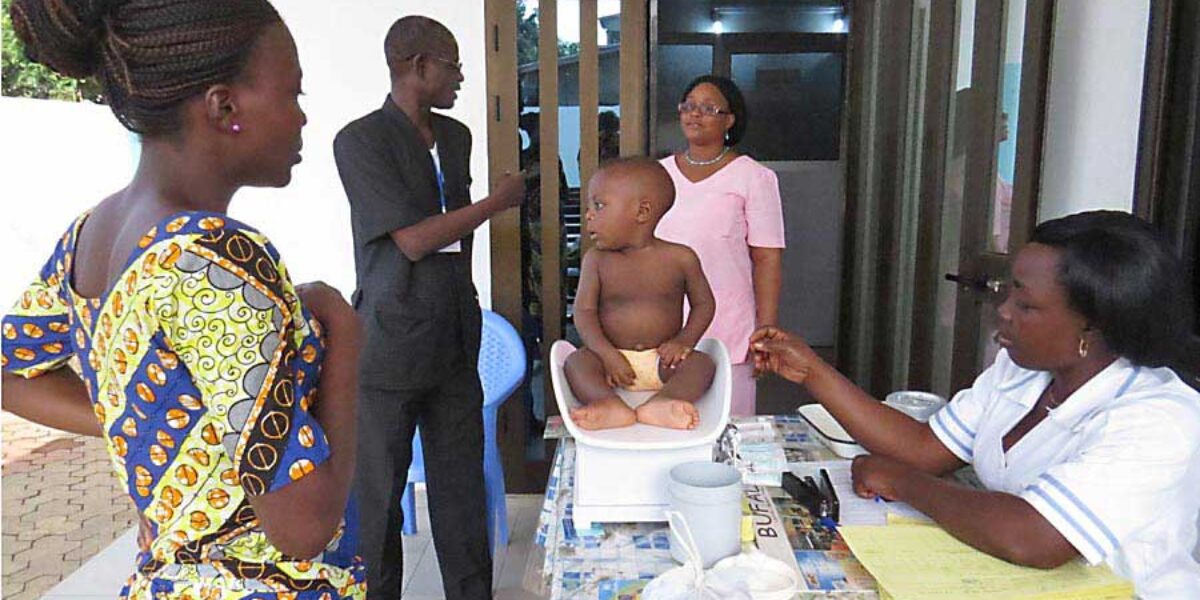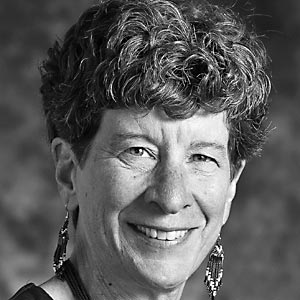Bethesda Hospital
ONG Bethesda is a health-care complex that took its inspiration from the biblical parable of the Good Samaritan who cared for someone deemed unworthy by people with resources and power. The churches of Benin founded the hospital in 1990 in partnership with Mennonite Mission Network. Through this ministry, the churches reached out to the least-served people in their communities and went beyond merely treating the symptoms of illness. Hospital personnel invested in community development initiatives and programs emerged that addressed neighborhood sanitation, job creation, and loans for small businesses.

Colombe Dandonougbo came to visit her father, Abraham (right), an employee of Bethesda Hospital, during her school lunch break. Colombe is taken under the wing of Dr. Barthélemy Dossou-Bodjrenou, ophthalmologist and coordinator of the hospital and associated ministries, who tries to convince all young people to become doctors. Photo by Lynda Hollinger-Janzen.
Benin Bible Institute
In October 2014, Benin Bible Institute, located in Cotonou, Benin’s largest city, celebrated its 30th anniversary with a four-day gala. Students danced through the streets to the accompaniment of a brass band to invite neighbors to share their joy. Although the school started its systematic degree program in 1994, the board of directors decided the school’s inception came when Mennonite Board of Missions worker David Shank taught the first Bible seminar.

Robert Hounkpevi and Bruce Frey teach a church history class at Benin Bible Institute. Since many Beninese are first-generation Christians, like the writers of the New Testament, issues discussed are not obscure historical scenarios, but events they deal with in their daily lives. Photo by Lynda Hollinger-Janzen.

Josué Sonounameto and Henri Keke take notes at Benin Bible Institute. Photo by Lynda Hollinger-Janzen.
Agro-pastoral program with BBI
An 18-bed dormitory and a classroom have just been completed, enabling BBI students to live on the farm, which is an hour’s drive from the Bible institute. Experience in farming will give pastors in rural congregations a means to feed their families, as many churches are too small to provide a pastor with a living salary. Pastors will also be able to spread concepts in sustainable agriculture to remote parts of the country. Currently, the farm is producing plantains, papayas, vegetables, rabbits, and chickens for local markets.

Dominique Houngnon, farm manager for Benin Bible Institute’s agro-pastoral project, weeds seedlings. Photo by Lynda Hollinger-Janzen.
Development in Four Dimensions
Development in Four Dimensions started as a response to the high infant mortality rate in the Plateau region of Benin. It provides regular baby weighing and teaches mothers about health. Other projects to improve well-being in the region include an elementary school, a bakery, and a fish pond.

Bonaventure Akowanou and Jean-Baptiste Hounmondji discuss new Development in Four Dimensions projects. Hounmondji is the national president of the Universal Evangelical Church and the founder of D4D.Hounmondji’s daughter, Schiphira, takes note for her future leadership role. Photo by Lynda Hollinger-Janzen.

Camile Houndomdji surveys his artisanal bakery with pride. Ovens, bread pans, and shelves are all made with local materials. Photo by Lynda Hollinger-Janzen.
PEBCo, Promotion d’Epargne-Crédit à Base Communautaire
The idea for this community bank was born in 1995 after a child of a community health worker died of malnutrition. Staff of Bethesda Hospital realized that knowledge alone isn’t enough for health. Resources to put knowledge into practice are also necessary. A nationwide network of PEBCo offices permit 100 percent of Benin’s population to access financial services with a walk of five miles or less. At first the community bank catered to women and helped them establish businesses to make yovo doko, a snack similar to doughnut holes, or to buy a stock of soap and kerosene to sell from stands in front of their homes. Now, PEBCo has become one of the nation’s most trusted financial institutions and serves all segments of society.

Pascal Tamegnon has been PEBCo’s administrator since the community bank’s early days. Photo by Lynda Hollinger-Janzen.

Liduine Tokoudagba helps a PEBCo client open an account. Photo by Lynda Hollinger-Janzen.
La Casa Grande
La Casa Grande is a home for children in difficult circumstances. Often, both parents have died and relatives don’t have the resources to feed and educate extra children. At La Casa Grande, children become part of an intentional extended family with 50 brothers and sisters. La Casa Grande’s goal is to surround the children with a loving, Christian environment that prepares them for a bright future through academic studies and technical apprenticeships. They are also extending this hope to the surrounding community through the Les Leaders (Leaders) school and literacy programs for adults. 
Annoncia fills in her workbook at La Casa Grande’s Les Leaders (Leaders) School. Photo by Lynda Hollinger-Janzen.

Ferdinand Sounouadéte studies his Bible at La Casa Grande Children’s Village. Photo by Lynda Hollinger-Janzen.

A community volunteer uses wood-working equipment sent by the municipal government in Burgos, Spain. Grace Woodworking is part of the La Casa Grande enterprise where children will be taught trades through apprenticeships. Photo by Steve Wiebe-Johnson.








